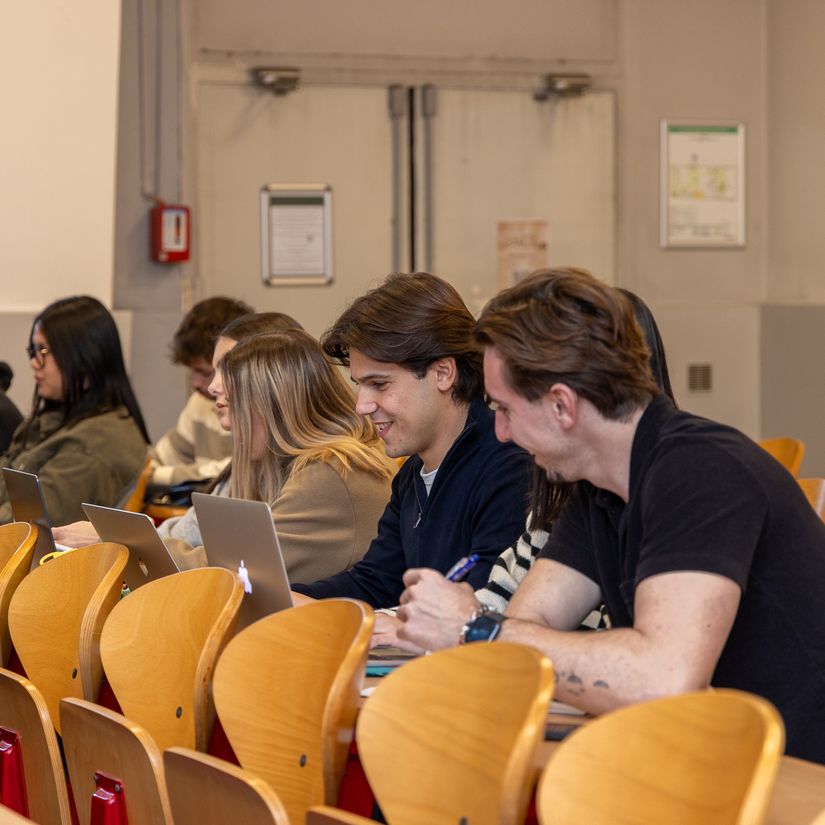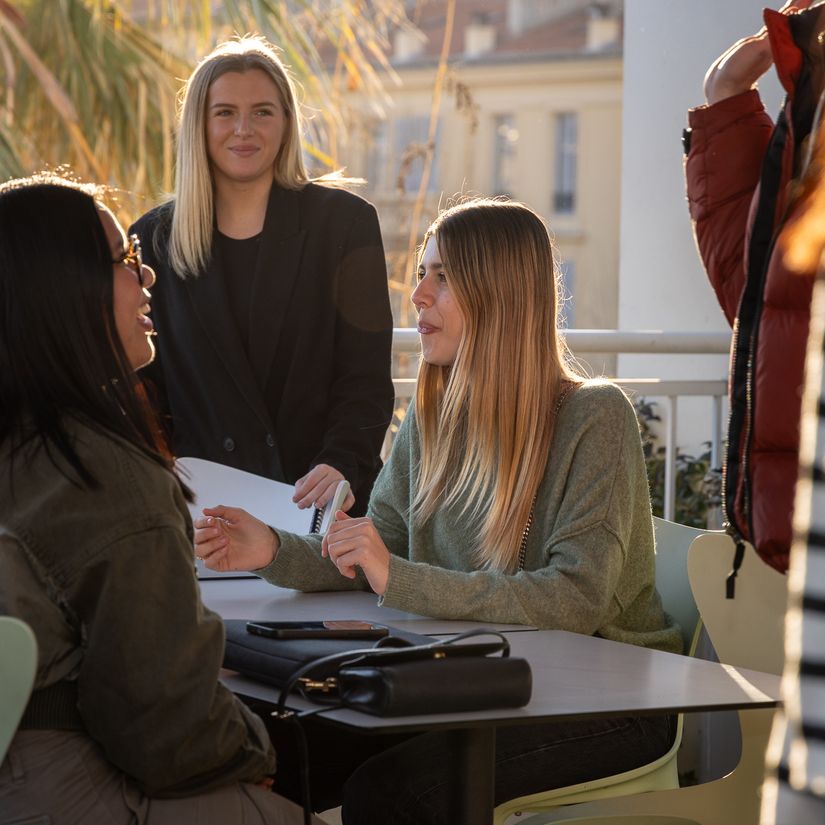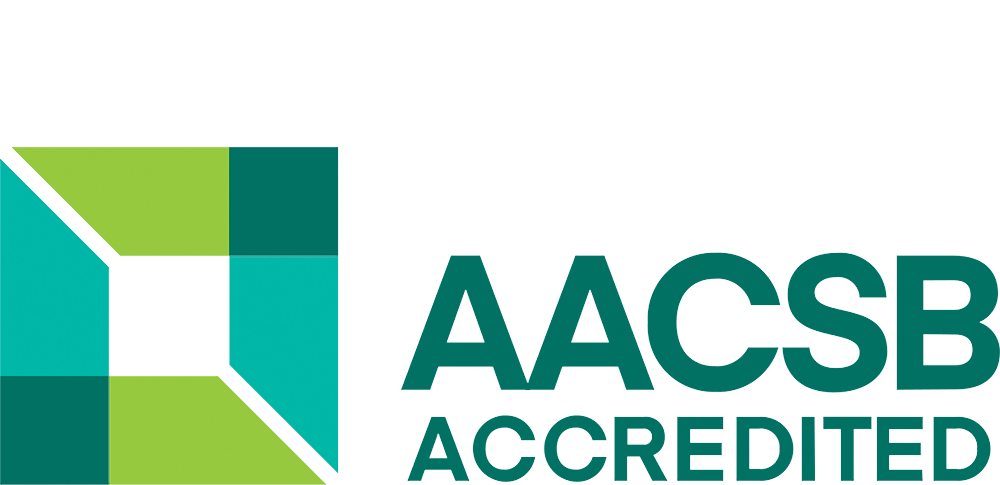Erasmus+
The Erasmus+ programme at a glance
Erasmus+ is the European Union's flagship programme for education, training, youth and sport. It supports the mobility of students, teachers and staff, while promoting cooperation between higher education institutions, businesses and other organisations.
IPAG Business School actively participates in this programme to offer its students and staff opportunities for international exposure, both academic and professional.
What Erasmus+ support is available?
Erasmus+ offers two types of scholarship to support mobility:
- Study grants: for a semester or a year at a partner university in Europe.
- Work placement grants: for a work placement in a company or organisation abroad.
These grants contribute towards the costs associated with mobility (transport, accommodation, etc.). The amount varies according to the destination and duration. An ‘inclusion’ supplement may be granted to students with disabilities or from low-income backgrounds.
Scholarship amounts by country group
The countries in the programme are divided into three groups according to cost of living:
- Group 1 (high cost of living) : Austria, Belgium, Denmark, Finland, Germany, Iceland, Ireland, Italy, Liechtenstein, Luxembourg, Netherlands, Norway, Sweden
- Group 2 (medium cost): Cyprus, Czech Republic, Estonia, Greece, Latvia, Malta, Portugal, Slovakia, Slovenia, Spain
- Group 3 (low cost): Bulgaria, Croatia, Hungary, Lithuania, Northern Macedonia, Poland, Romania, Serbia, Turkey
*United Kingdom and Switzerland: mobility may be eligible for funding, subject to specific conditions*.
Payment: 70% of the grant is transferred at the start of the placement, 30% at the end, once the administrative and educational requirements have been validated.
Practical information
A mobility programme which our 3rd and 5th year students in the Grande École Programme can benefit from. Professors and staff also have the opportunity to teach and experience job-shadowing.
To qualify for an Erasmus+ grant, you must :
- Be enrolled in a PGE, state-approved Bachelor's or BTS programme
Undertake :
- 3 to 10 months' study mobility or 2 to 4 months' work placement mobility
- No more than 12 months' Erasmus+ mobility per cycle (Bachelor's/Master's)
- Go to a country participating in the programme
Applications must be made each year according to the following timetable:
- For a 1st half-year departure: before 15 October 2025
- For a 2nd semester departure: before 15 March 2026
📧 For any questions or assistance:
- Françoise Mespoulier : f.mespoulier@ipag.fr
- Caroline Ferrero : c.ferrero@ipag.fr
In accordance with the European Commission's guidelines, IPAG is aligned with the following priorities:
1. Inclusion
Facilitating the participation of people with fewer opportunities through :
Supplementary grants
More flexible mobility formats
2. Ecological transition
Promoting sustainable mobility through :
A 'green travel' package
Projects to raise awareness of sustainable development
3. Digital transformation
Strengthening digital skills through :
The Digital Opportunity Traineeship initiative for students and staff
For more information, you can contact:
Caroline Ferrero - Head of International Relations Office - Erasmus Programme - +33 (0)4.93.13.39.20 - c.ferrero@ipag.fr
Françoise Mespoulier - International Relations Assistant -
f.mespoulier@ipag.fr
Jaime Garcia - Coordinateur Incoming ERASMUS et Mobilité Internationale Immigration Officer - +33 (0)1.53.63.36.98 - j.garcia@ipag.fr

Erasmus+ mobility for academic and administrative staff
Erasmus+ mobility
IPAG Business School encourages the mobility of its staff, both teaching and non-teaching, as part of the Erasmus+ programme.
Two types of mobility are possible:
- Staff Mobility for Teaching:
Allows teachers to teach in a European partner institution. These assignments strengthen academic links and encourage the exchange of good teaching practice. - Staff Mobility for Training:
Open to all staff (academic or administrative), this mobility enables them to take part in workshops, observation periods, international weeks or training courses in a foreign institution or organisation.
These exchanges, which last from 2 to 5 days (excluding travel), are financially supported by the Erasmus+ programme (travel and accommodation costs) and are designed to enhance skills, international openness and inter-institutional cooperation.
For further information or to apply:
👉 Contact the International Relations Department Caroline Ferrero c.ferrero@ipag.fr
IPAG's commitment to Erasmus+
At IPAG Business School, Erasmus+ supports the internationalisation strategy in three ways:
- Internationalisation of the school: partnerships, Erasmus+ participation, international recruitment of professors
- Enhancement of student career paths: integration of mobility into curricula, academic recognition
- Visibility and excellence: rankings, accreditations, alumni network, etc.



Rights and duties of Erasmus+ participants
All participants selected for an Erasmus+ mobility benefit from rights and must respect certain obligations laid down by the European Commission. These commitments are defined in the Charter
As an Erasmus+ participant, you have the right to :
- Fair and non-discriminatory treatment
- Academic recognition of activities carried out abroad
- Clear information on funding and procedures
- Administrative and pedagogical support before, during and after mobility
- Access to host institution services (library, accommodation, language support)
You also undertake to :
- Respect the rules of the host establishment
- Complete the required Erasmus+ documents (Learning Agreement, reports, certificates)
- Take an active part in the course or work placement
- Complete the EU Survey on your return
FAQ
To be eligible for an Erasmus+ grant, you must be registered at a higher education institution, such as a University. You must also be enrolled on a course that will lead to a recognised degree, or a tertiary-level qualification.
You must be a member state of the European Union, or fall under one of the following countries to be eligible for the Erasmus programme.
Yes, Erasmus France programmes are available to all students within the aforementioned countries. At IPAG we proudly host Erasmus students on our courses, and students on our Grand Ecole programme can enjoy the benefits of it in their 3rd and 5th years.
Your Erasmus+ monthly allowance depends on which country group you have come from and the length of exchange. As designated by the DAAD, group 1 students would typically receive €700 per month, whereas students from group 2 would typically receive €500 a month.
Erasmus programmes in Paris offer some of the best experiences in Europe. Paris itself is a beautiful city with a unique culture, delicious food and great diversity.
IPAG currently operates 3 campuses: Paris, Nice and Thionville-Luxembourg offering students courses that are recognised worldwide. Each campus offers its own unique experience and atmosphere. They are also easily accessible from anywhere in Paris.
Taking part in the Erasmus programme, whether it’s in France or elsewhere, is a fantastic experience that students should take advantage of if available. It allows you to enjoy different cultures, learn new languages, and meet new friends. Even if you miss home from time to time, the experience of being in a new country will expand your mind, and could even provide life-changing opportunities.
As the capital city of France, Paris can be an expensive place to live, with expenses going towards rent. Even with the Erasmus grant, students should try to be responsible with their money, to prevent any potential concerns.
Consider also that students of IPAG have access to a range of IPAG grants and scholarships that can work alongside your Erasmus+ grant. These scholarships are available to help all students if the right criteria is met, and can help you live comfortably and enjoy the sights and sounds of Paris.
For more information on Living in France, consider viewing our International Students page today.
If you choose to attend IPAG on the Erasmus scheme, look out for the Erasmus Paris parties that happen throughout the year. These parties generally involve a number of students on the Erasmus exchange scheme meeting up to enjoy the Parisian nightlife.
There are also social media accounts dedicated to Erasmus students, such as the Erasmus Paris Student Network, which aims to help Erasmus students understand their new country, as well as make friends and find language partners.
For those attending IPAG’s Nice Campus, there are also plenty of opportunities to meet up with fellow Erasmus students through the Erasmus Student Network in Nice.
This network is ideal for any international students in Nice, and offers:
- Opportunities to make new friends and acquaintances
- Chances to explore the Nice nightlife
- Exciting new adventures around Nice and the surrounding countryside
- Language exchange evenings
- Advice and support on living in a new country
- And much more!
For more information around Nice, be sure to view our Accommodation Guide and our Nice Campus page, both of which provide useful information on living in Nice, and courses available.



